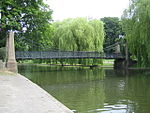Waulud's Bank is a possible Neolithic henge in Leagrave, Luton dating from 3,000BC.
The Waulud's Bank earthworks are in the North of Luton and are situated on the edge of Leagrave common, with Central Leagrave to the south east and Marsh Farm to the west. The River Lea runs alongside on the western side, its source located within the vicinity of the surrounding marsh. Archaeological excavations in 1953, 1971 and 1982 date the site to around 3000 BC, in the Neolithic period, although there was evidence of earlier mesolithic hunter/fisher activity in the immediate area. The 'D' shape of the earthwork is almost identical to that of Marden in Wiltshire, both sites have a river forming one side, and each produced neolithic grooved-ware pottery. Waulud's Bank lies on a glacial ridge near which runs the prehistoric Icknield Way. Initially it was probably a domestic enclosure used for cattle herding. It has been suggested that it later became a henge monument, although the position of its surrounding ditch outside its timber-faced bank would be unusual. Evidence suggests that the site was briefly re-used in the Iron Age, during the Roman occupation and in medieval times.
The enclosure consists of a bank and external ditch of around 7 hectares with a turf-revetted chalk and gravel bank faced by a wooden stockade. No entrances have been identified. Most external features have been destroyed by a 19th-century gravel quarry on the south, and the irresponsible dumping of tons of chalk and top-soil along the eastern side during building construction of Marsh Farm in the 1970s. Geophysical surveys in July 1985 and January 2009 failed to reveal any very positive indications of internal features.
The bank still stands 2.6 m high in places and on the north side the excavated ditch was 9.2 m wide and 2.1 m deep. Finds included neolithic pottery, animal bones and flint arrow heads (some are on display at Stockwood Heritage Centre, Luton Museum).
The building at the edge of Waulud's Bank was a one time farmhouse called Marsh Farm House, the occupants of which owned the area that later became Marsh Farm.








